Summary:
Wondering how driverless cars or chatbot lawyers will change the ways we work and live? Join us for a LIVE White House Conversation on automation.

There's a promising fix for any city with transportation issues -- and car ownership has nothing to do with it.
A new study found that cities that turn to a flexible type of car-sharing stand to benefit from less pollution, less traffic and more parking.
Researchers at the University of California-Berkeley's Transportation Sustainability Research Center focused on the impact of car2go, which is different from car services like Zipcar and GM's (GM) Maven. With car2go, drivers paying a one-time $35 membership fee and can rent a vehicle parked on a nearby public street and leave it elsewhere in the city. There's no need to reserve a vehicle ahead of time, or return it to a designated parking lot. Car2go strikes deals with local governments so that its cars can be parked in public spots.
You’ve seen photos of self-driving cars zooming down California highways and read about lawyers that are actually chatbots. These are some of our first encounters with automation and artificial intelligence (AI). And if you’re wondering how these types of technology will change the ways we work and live, you’re not alone.
There's no shortage of predictions. Depending on who's talking, it will be the source of tremendous opportunity or a challenge to even our most basic institutions. In any event, it's no longer just the stuff of science fiction. Our growing reliance on automation implies some big public policy questions. Some that we're already grappling with, and others we'll need to tackle in the coming years.
On Tuesday, July 5, White House Chief of Staff Denis McDonough will host a conversation with Robin Chase, transportation entrepreneur and author, and Martin Ford, author and futurist, to help shed some light on these issues. They’ll discuss and debate the nuanced aspects of automation, from what it means for jobs to laws to how we spend our days.

In addition to the White House Facebook page, you can watch this conversation LIVE on Business Insider’s and Futurism’s pages, on Tuesday at 1:15PM EDT. You can also get ready for the conversation by checking out more information about automation from Futurism.
Have a question about automation that you’d like to hear in the conversation? You can join the discussion by submitting your question below.
On Wed, Jun 29, 2016 at 12:52 PM, Robert Cohen <bcohen@bway.net> wrote:
Jeff,
I agree with you on your optimism. I find your comments are enormously interesting. These advances might have a far more positive impact on economic development than many expect.
Australia has a fine history of invention and innovation, with ideas ranging from the stump jump plough and Hills hoist through to Jira , Wireless ,the flight data recorder and Cochlear ear implants change the world.
(Watch this space re the bionic Eye - follow Nigel Lovell)
Cochlear itself forms the centre of an Australian hearing technology hub at Macquarie University which brings together university researchers, private sector R&D and some of the world’s best medical specialists to form a globally competitive centre of excellence. We can do great things.
Remaining lucky in the 21st Century is going to take more than riding on the back of sheep, the end of coal train or surfing the wave of easy credit that crashed over our economy in the 25 years after 1990.
We are going to have to be (and indeed we are smart, canny and adventurous.
Australians have shown they can grasp opportunities and with government policies that favour innovation over speculation, investment over ticket clipping, a business community that pulls its weight in research and a community that values education at all levels we can do it.
So yes, Innovation can save Australia but we as a nation have to be prepared to work at it and change many of our current ways of thinking.
(Commentary inspired from www.paulwallbank.com)